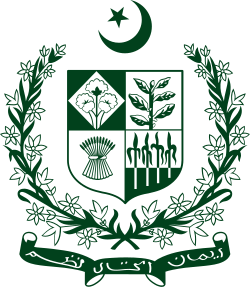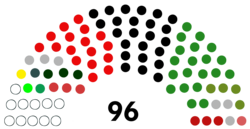
Back Εκλογές στο Πακιστάν Greek Élections au Pakistan French पाकिस्तान में चुनाव Hindi Pemilihan di Pakistan ID پاکستان وچ چوناں PNB Eleições no Paquistão Portuguese پاکستان میں انتخابات Urdu
 |
|---|
|
|
Since establishment in 1947, Pakistan has had a non-symmetric federal government and is a federal parliamentary democratic republic. At the national level, the people of Pakistan elect a bicameral legislature, the Parliament of Pakistan. The parliament consists of a lower house, the National Assembly, elected directly via first-past-the-post voting, and an upper house, the Senate, whose members are chosen by elected provincial legislators. The head of government, the Prime Minister, is elected by the majority members of the National Assembly and the head of state (and figurehead), the President, is elected by the Electoral College, which consists of both houses of Parliament together with the four provincial assemblies. In addition to the national and provincial assemblies, Pakistan has over five thousand elected local governments.
The Election Commission of Pakistan is a constitutionally-established institution chaired by an appointed and designated Chief Election Commissioner, supervising general elections. The Pakistan Constitution guides general elections in Part VIII, Chapter 2 and various amendments. A multi-party system is in effect, with the National Assembly consisting of 342 seats and the Senate consisting of 100 seats (after ex-FATA merger)[1] elected from the four provinces. The Constitution dictates general elections be held every five years, when the National Assembly has completed its term or has been dissolved, and Senatorial elections be held every six years. By law, general elections must be held within two months of the National Assembly completing its term.[2]
- ^ "Senate of Pakistan".
- ^ Constitution of Pakistan. "Article 577". Constitution of Pakistan. Retrieved 23 May 2013.
© MMXXIII Rich X Search. We shall prevail. All rights reserved. Rich X Search

